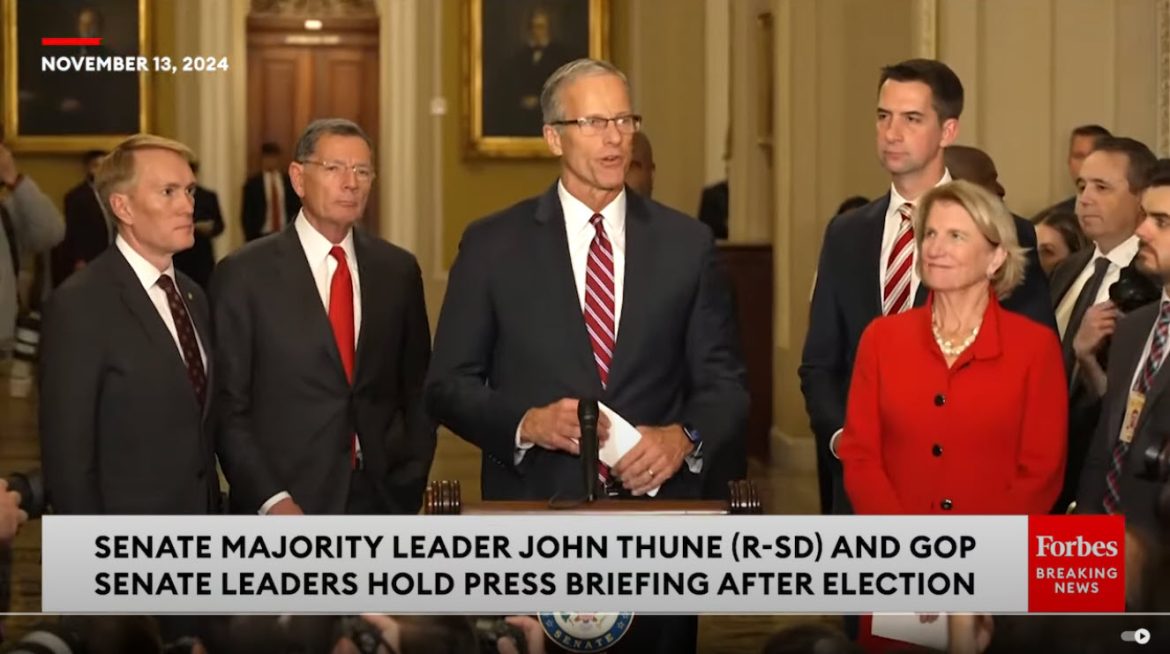In a pivotal shift within Senate leadership, South Dakota’s John Thune has been elected as the new leader of Senate Republicans, succeeding Kentucky’s Mitch McConnell. Thune’s election comes after a closely contested race in Washington, where he faced Texas Senator John Cornyn in a final vote following the elimination of Florida Senator Rick Scott in the first round. This leadership change signifies a generational shift within the GOP’s upper chamber ranks and brings a new dynamic to the Republican approach in the Senate.
The vote, held behind closed doors, reflects a concerted move within the Republican caucus to usher in fresh leadership following McConnell’s decision to step aside. McConnell, who has served as the Republican leader for over a decade, announced earlier this year that he would not seek re-election for the leadership role, opening the door for the next generation of Senate Republicans to take the reins.
After his election, Thune addressed reporters with a sense of urgency, underscoring that he and his team are prepared to work quickly on upcoming legislative priorities. “We are committed to moving forward with purpose and efficiency,” Thune stated, emphasizing that Republican senators are focused on streamlining policy measures that align with President-elect Trump’s agenda. Thune expressed strong support for Trump’s administration, pledging that the Senate will work closely with the President-elect to advance conservative goals and uphold the party’s vision.
Thune’s close relationship with McConnell and his reputation as a skilled negotiator helped secure the confidence of his colleagues in the leadership vote. Known for his calm demeanor and consensus-building approach, Thune is expected to bring a collaborative yet assertive style to the Senate floor. His focus, according to GOP insiders, will include advancing key Republican objectives on issues like tax reform, national security, and healthcare.
In contrast, Thune’s opponent, Senator Cornyn, has been known for his more hawkish stance on defense issues and a deep understanding of Senate rules. Although Cornyn ultimately lost the leadership race, he is expected to play a significant role in legislative discussions, especially in areas related to judicial appointments and defense policy.
Thune’s victory has sparked conversations about the Republican Party’s evolving identity, with some analysts viewing his election as a sign of the GOP’s interest in maintaining a balance between traditional conservative values and more pragmatic governance. Political analyst Laura Stinson comments that Thune’s leadership may mark a shift toward cooperation on certain issues while maintaining the party’s commitment to core conservative principles. “Thune represents the Republican Party’s desire to appeal to both moderates and conservatives, blending a disciplined approach with broad outreach,” Stinson explains.
As the Senate prepares for a busy session, Thune’s leadership will be tested by the ongoing challenge of unifying a diverse caucus that includes both staunch Trump allies and more moderate voices. Thune’s role will require navigating intra-party dynamics as well as working with a potentially divided Congress.
The transition from McConnell to Thune is viewed by many Republicans as a passing of the torch, with Thune poised to bring a fresh but steady hand to the Senate GOP. McConnell, widely respected for his strategic acumen, leaves a legacy of conservative victories, including pivotal Supreme Court appointments. Thune’s colleagues have praised him as a natural successor who is well-equipped to lead Senate Republicans into a new era.
In his closing remarks after the vote, Thune emphasized the importance of unity within the Republican Party, noting that he is committed to strengthening bonds among senators as they work to advance the conservative agenda. “Our mission is to serve the American people with integrity and to lead with resolve,” he said. “The challenges we face require us to stand together, to work together, and to deliver results that make a difference.”
With the support of Senate Republicans and a clear mandate to lead, John Thune steps into his new role ready to shape the GOP’s direction in the Senate. The weeks ahead will be critical as Thune sets his priorities and works to align the party’s legislative efforts with those of the incoming Trump administration.



